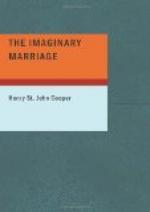But there was nothing fearsome about the Rundle who faced little Ellice Brand. There was a smile on the man’s lips, in his eyes a look of intense gratitude.
Ragged and disreputable person that he was, he would have lain down and allowed this little lady to wipe her feet on him, did she wish it.
“How is Snatcher?”
“Fine, missy!” he said. “Fine—fine!” His eyes glistened. “Snatcher’s going to pull through, missy. ’Twas a car did hit he,” he added, “and I saw the chap who was in it. I saw him, and I saw him laugh when Snatcher went rolling over in the dust. I’ll watch out for that man, missy.”
“Tell me about Snatcher!”
“Leg broke, and a terrible cut from a great flint; but he’ll pull through—thanks to you!”
“To Mr. Vinston, you mean!”
Rundle shook his head. “To you. He wouldn’t ’a come for me, nor Snatcher; he hates my poor tyke. But he’s put Snatcher right for all that, and because you made him do it, and I don’t wonder!” Rundle looked at her. “I don’t wonder,” he added. “There’s be few men who wouldn’t do what you’d tell ’em to.”
“Now,” said Ellice, “you are talking absurdly. Of course I just shamed Mr. Vinston into doing it. I’d like to come and see Snatcher, Rundle.”
“The queen wouldn’t be as welcome,” he said simply.
Helen expressed no surprise at the unseasonable return of Joan and Johnny from their trip. There was no accounting for Joan’s moods; the main and the great thing was, it was due to no quarrel between them.
Johnny stayed to lunch. After it, Joan left him with Helen and went to her own room. She wanted to be alone, she wanted to think things out, to decide how to act, if she were to act at all.
“He called me ungenerous—three times,” she said, “ungenerous and—and now I know that I am, I deserve it.” She felt as a child feels when it has done wrong and longs to beg for forgiveness. In spite of her pride, her coldness and her haughtiness, there was much of the child still in Joan Meredyth’s composition—of the child’s honesty and the child’s frankness and innocence and desire to avoid hurting others.
“It was cruel—it was cowardly. But why is he here? What right has he to come here when I—I told him—when he knows—that I, that Johnny and I—”
And now, with her mind wavering this way and that way, anxious to excuse herself and blame him one moment, condemning herself the next, Joan took pen and paper and wrote hurriedly.
“I am sorry for what I did. It was inexcusable, and it was ungenerous. I ask you to forgive me, it was so unexpected. Perhaps I have hurt myself by doing it more than I hurt you. If I did hurt you, I ask your forgiveness, and I ask you also, most earnestly, to go, to leave Starden.”
She would have written more, much more, words were tumbling over in her brain. She had so much more to say to him, and yet she said nothing. She signed her name and addressed the letter to Hugh Alston at Mrs. Bonner’s cottage. She took it out and gave it to a gardener’s boy.




